Contents
Smooth mushroom is one of the representatives of the large Russula family. Its other common name is common milkweed. Grows singly and in groups. A distinctive feature of the species, like all its close relatives, is that when cut, milky juice is released from the pulp. In official reference books it can be found under the name Lactarius trivialis.
Where does the milkweed grow?
Gladysh is a purely forest mushroom. It grows in coniferous and deciduous forests, as well as in mixed plantings. This species is found in sandy and clayey soils rich in limestone. Smoothness requires high humidity, so it can often be found near swamps and in moss.
Gladysh is distributed throughout Eurasia in the northern regions, where conditions are more favorable for its growth.
What does a smooth mushroom look like
According to the photo and description, smooth is a large mushroom with a classic shape of the fruiting body. The diameter of its upper part can reach 7-15 cm. In young specimens, the hat is hemispherical, and its edges are tucked down. It is convex in the center. As it matures, the upper part of the fungus opens and becomes funnel-shaped. With a slight physical impact, it easily breaks, crumbles.
The color of the hat includes a gray, lead and purple hue. In young mushrooms, the hat is most often light lilac, and then it becomes pink-brown or yellowish-lilac. The surface is smooth, but with high humidity it becomes slippery.
The flesh is fleshy, dense, of a yellowish hue; when it is broken, a milky juice appears, which is white in smoothness, but turns a little green when exposed to air.
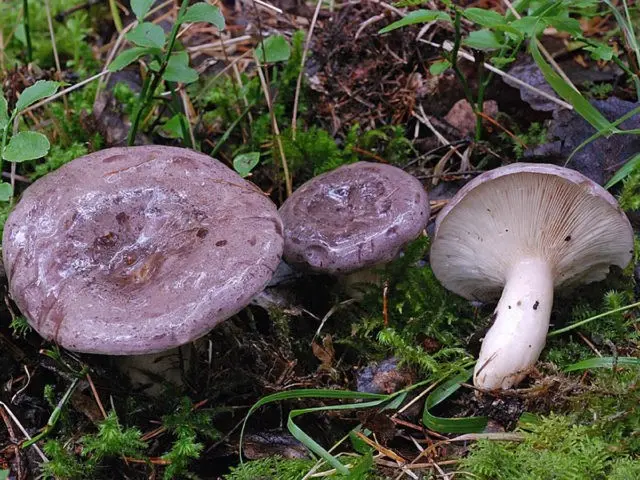
The mushroom smell of smoothness is practically not captured
On the reverse side of the cap are frequent descending plates of a light cream shade. In ripe smoothies, yellowish stains or spots from leaking milky juice may appear on them. Spores are rounded, prickly, colorless. Their size is 8-11 x 7-9 microns. Creamy spore powder.
The leg of the smoothie is cylindrical, its length can reach from 5 to 15 cm, depending on the growing conditions. The thickness varies from 1 to 3 cm. It is identical in color to the hat, but a tone lighter. At a young age, the fungus forms a small cavity inside the stem, which only increases as it grows.
Edible or not smooth mushroom
According to official data, the common milkweed is classified as an edible species. But because of its peculiarity to secrete milky juice, it requires preliminary preparation before cooking. In terms of taste, it belongs to the second category.
Smooth mushroom is considered the best for salting, as in the process of cooking it loses its bitterness and acquires a pleasant elasticity.
False twins of the common smooth
As can be seen in the photo, it is difficult to confuse the common lactic with other species due to the peculiar color of the fruiting body. But not all novice mushroom pickers are able to accurately distinguish smooth from doubles. Therefore, similar species and their features should be studied.
Milky faded
This is a close relative of the common smooth and also belongs to the Russula family. The upper part is gray-brown or wine-brown. Moreover, its center is much darker. The leg is slightly lighter, tapers at the base. The size of the fruiting body is smaller than that of the smooth. The diameter of the cap is 4-10 cm, and the length of the stem is 4-8 cm. When the pulp is broken, milky juice oozes abundantly. It is white in color but takes on an olive hue when exposed to air. The mushroom is considered conditionally edible and requires preliminary soaking. The official name is Lactarius vietus.
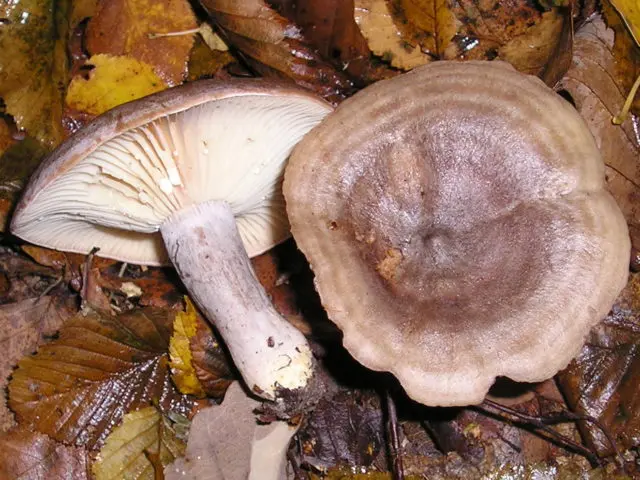
The pulp tastes like a faded milky burning-sharp
Serushka
This species also belongs to the Russula family and is considered conditionally edible. Often you can hear other names of the fungus: gray hollow, gray, putik, podoreshnitsa, plantain. The diameter of the upper part reaches from 5 to 10 cm. Its shape is initially convex, and then becomes funnel-shaped, but a slight elevation remains in the center. Edges are uneven and wavy. The surface has a grayish-lead shade, there is an order of magnitude less mucus than that of the smooth. On the reverse side of the cap, one can see rare wide plates, often sinuous. The leg is cylindrical, in tone of the upper part. Its structure is loose. The official name is Lactarius flexuosus.
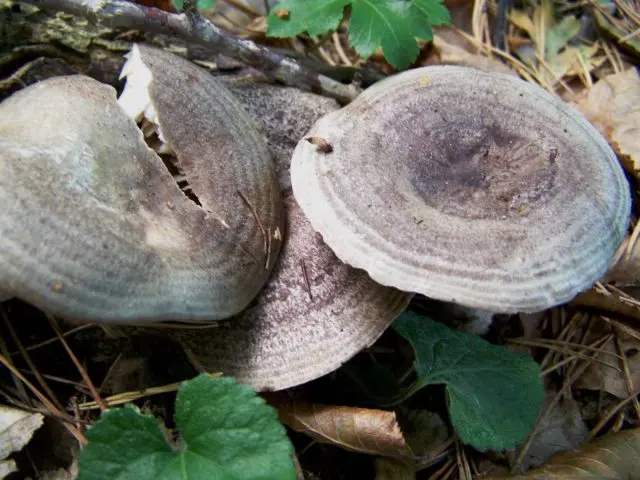
When broken, the pulp of the serushka exudes a light fruity aroma.
Gray-pink breast
Another representative of the Russula family. In foreign sources, it is listed as a slightly poisonous mushroom, in – conditionally edible, but of little value. The fruiting body is large. The size of the cap in diameter reaches 8-15 cm. It is characterized by an irregularly rounded shape. Initially hemispherical, and later becomes like a funnel, but some specimens retain an elevation in the center. The color is dull, includes pink, gray, brown and brown. The surface is velvety, it remains dry even at high humidity. The pulp, when broken, exudes a strong spicy smell, the taste is sharp-burning. The leg is thick, 5-8 cm high. The official name is Lactarius helvus.
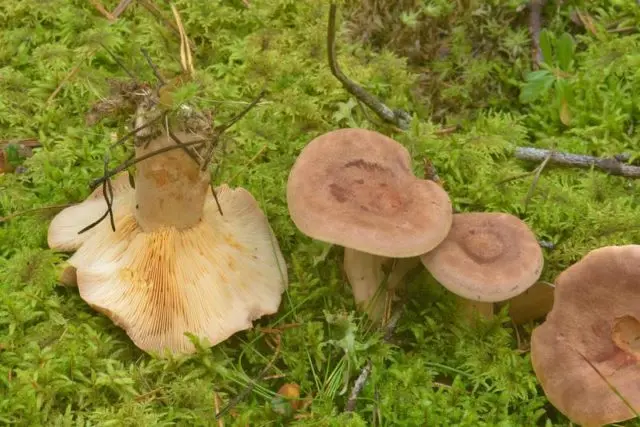
The milky juice of a gray-pink milk mushroom is transparent and scarce, in overripe species it may be completely absent
Rules for collecting lactic mushrooms
The fruiting period of the smoothysh falls on the second half of July and lasts until the beginning of September. At this time, you need to go into the forest in search of him, taking with you a sharp knife and a basket.
Smooth mushrooms for salting need to be collected small, as young specimens have a denser pulp. Cut them off at the warp, leaving a small stump in the soil. This method ensures that the mycelium remains intact and can bear fruit next year. Before putting the mushroom in the basket, it must be thoroughly cleaned of the earth and fallen leaves.
How to cook smooth mushroom
Milky mushroom for salting should be used only after primary processing. This is necessary to neutralize the pungent taste of the pulp.
Initially, milkers need to be cleared of the remnants of forest litter and earth. If necessary, remove all damaged areas and wash thoroughly. After that, the smooth mushroom should be soaked in water for 24 hours, and the liquid should be changed at least five times during this period.
At the end of this procedure, you can proceed to further cooking.
smooth mushroom recipes
The method of salting the common milkweed can be hot and cold. But any processing must be carried out after pre-soaking.
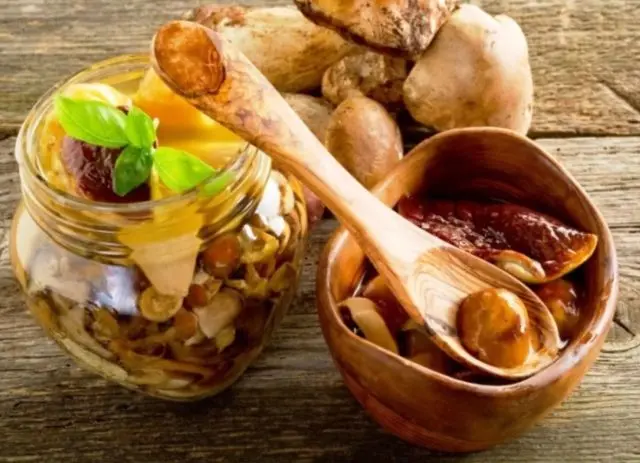
Smoothies are great for pickling, but this does not mean that they cannot be marinated.
Hot salting
To pickle 2 kg smoothies in a hot way, you will need:
- vegetable oil – 150 ml;
- salt – 50 g;
- water – 1 l;
- garlic – 1 large head;
- bay leaf – 2-3 pcs .;
- currant leaves, dill – optional;
- allspice – 5 pcs.
Procedure:
- Boil water, salt, pour mushrooms into it.
- Add spices, and then boil over low heat for 50 minutes.
- Drain liquid into container.
- Put milkers, garlic, spices in steamed jars.
- Pour salt into the marinade, pour in oil, mix well.
- Fill the mushrooms with the resulting liquid to the top.
- Put garlic on top, roll up.
After cooling, the jars are rearranged in the basement.
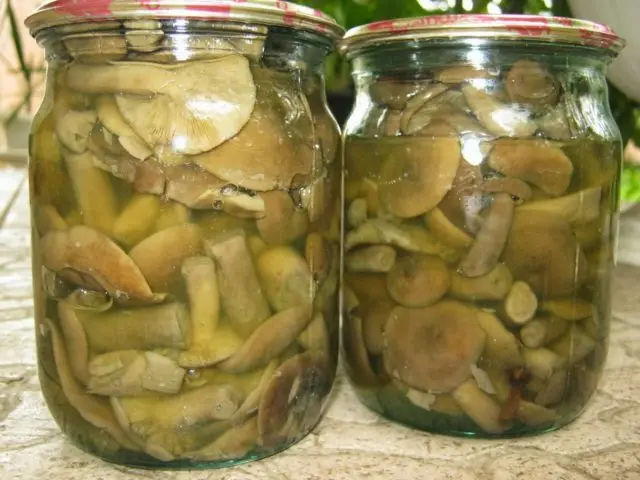
It is possible to store milkers prepared in this way for one season.
The usual salting method
For salting mushrooms (2 kg) in the classic way, you will need:
- salt – 70 g;
- cloves – 6 pcs.;
- bay leaf – 3 pcs .;
- allspice – 8 peas;
- garlic – 6 cloves.
Procedure:
- Pour salt into the bottom of a wide enameled container in an even layer.
- Lay mushrooms on top, top side down.
- Sprinkle chopped garlic and spices on them.
- Then repeat from the first step until all the mushrooms are layered.
- Sprinkle salt on top.
- Cover with multi-layer gauze, lay the load.
- Put the pot with mushrooms in a cool place.
With this method of preparation, the common lactic acid can be consumed in a month. And after two days, the mushrooms should be completely immersed in the liquid.
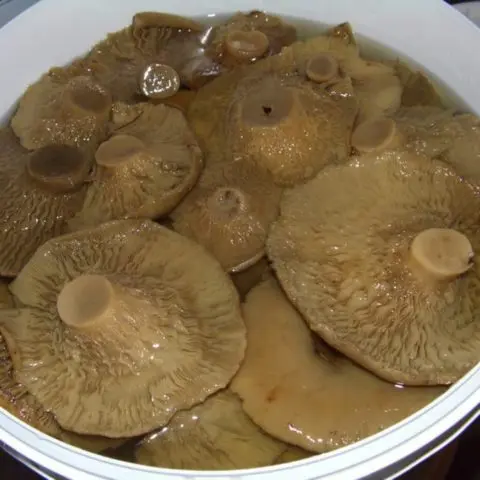
During the entire waiting period, the gauze must be periodically rinsed.
Pickled Smoothies
To pickle 2 kg of smooth mushrooms, you will need:
- water – 1,5 l;
- salt – 70 g;
- vinegar – 100 ml;
- sugar – 20 g;
- allspice – 5 peas;
- bay leaf – 2 pcs.
Procedure:
- Boil water (1 l) by adding 20 g of salt.
- Pour milkers, boil for 40 minutes.
- When finished, rinse with cold water.
- Pour 0,5 l of water into a separate container, add the remaining components, boil.
- Pour mushrooms into the marinade, boil for 15 minutes.
- Arrange milkers in sterilized jars, pour to the top.
- Sterilize for 20 minutes, roll up.
After cooling, transfer the pickled smoothies to the basement.
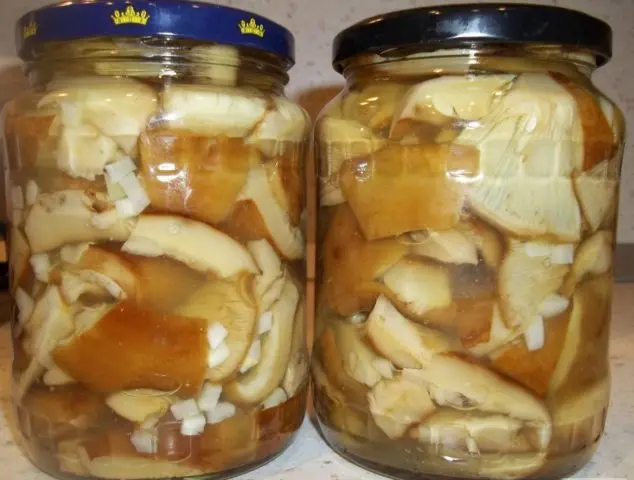
Pickled smoothies are no less tasty than salted ones.
Conclusion
Smooth mushroom, when properly prepared, is able to compete with more valuable species. Therefore, many lovers of quiet hunting are happy to collect it. In addition, this species often grows in large groups, and with luck, you can fill the basket in a matter of minutes.









